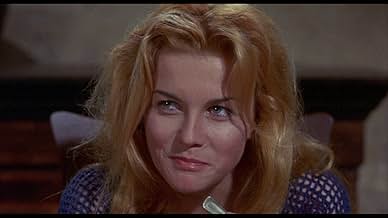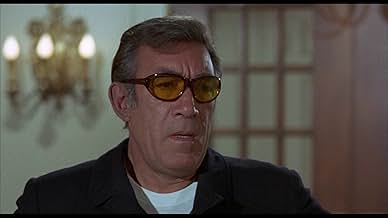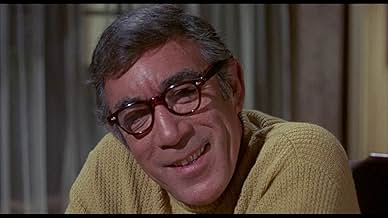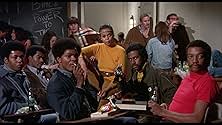R.P.M. stands for (political) revolutions per minute. Anthony Quinn plays a liberal college professor at a west coast college during the heady days of campus activism in the late 1960's. Rad... Read allR.P.M. stands for (political) revolutions per minute. Anthony Quinn plays a liberal college professor at a west coast college during the heady days of campus activism in the late 1960's. Radical students take over the college, the president resigns, and Quinn's character, who has... Read allR.P.M. stands for (political) revolutions per minute. Anthony Quinn plays a liberal college professor at a west coast college during the heady days of campus activism in the late 1960's. Radical students take over the college, the president resigns, and Quinn's character, who has always been a champion of student activism, is appointed president.
- Estella
- (as Ines Pedroza)
- Director
- Writer
- All cast & crew
- Production, box office & more at IMDbPro
Featured reviews
In a conversation on the stairwell toward the end of the film, Anthony Quinn and Gary Lockwood discuss change, indicating that nothing happened between Quinn's and Lockwood's respective generations. Nothing has happened in the two generations that followed, i.e. 1990 and 2010.
The sad fact is that society has degenerated. I graduated from a very liberal Big Ten school in 1962 and we didn't have campus unrest. After that, I began a successful career which was interrupted by the draft and a tour in Vietnam. I returned to work and became even more successful because I worked smart and hard. The draft saved me and I wish the draft would have never ended, although I think the Vietnam war was futile. Young men need military service to GROW UP! As for Ann Margaret, she always played sexy but never nude, except for her role in 'Carnal Knowledge' where viewers experienced her large arse.
Despite Ann's frivolous on-screen characters (I wonder how she was in private life) this was a film that predicts the future, as in...'Oh yah, life goes on, long after the thrill of living is gone.' (John Mellancamp).
Woodstock was in August of 1969. Altamont was in December of 1969. This means that the Woodstock Nation lasted barely four months. Elizabeth Taylor has kept husbands longer than that.
What the major studios did was get mainstream directors and told them make movies about youth in revolt. The result was movies like this which were very expensive imitations of movies that American-International had made in the sixties on nonexistent budgets.
RPM is watchable for a fine performance by Anthony Quinn. Lord, but he's a trooper. The script was obsolete before the ink dried on it. I'll be generous and say that Eric Segal's screenplay stinks. Of course, forty years later LOVE STORY doesn't get all that much love anyway.
The story centers on a Sociology professor who is picked to be president of a fictional college after protesting students occupy the administration building. The board has a late night meeting and decides to appoint Quinn president based primarily on the fact that he's sleeping with a graduate student in his department who is young enough to be his daughter.
Imagine trying to sell that to a major studio in today's Politically Correct world. Ann-Margret plays the graduate student and recognizes the script to be crap, so she has fun playing this airhead and wears ridiculous costumes and, in one scene, talks with while chewing food so that audiences won't have to understand the words she's saying.
Incredibly, this is directed by Stanley Kramer. Kramer had become a legend directing films like THE DEFIANT ONES, INHERIT THE WIND, SHIP OF FOOLS, JUDGMENT AT NUREMBERG, and GUESS WHO'S COMING TO DINNER, all of which dealt with Big Ideas from a socially progressive point of view. More importantly, they were full of characters that audiences could identify with and were fully realized human beings.
RPM is like a pageant put on by a community college Sociology department. Characters represent Sexual Freedom, Corporate Apathy, Prejudice, Sexual Liberation, Black Power, etc.
At its peak, the student revolution actually appealed to a very small per cent of students and had little support from the mainstream community. Worse yet, this film was released in the middle of Nixon's first term of office. Youthful idealism faded as more students pursued graduate studies in Business Administration.
Thanks to Turner Classic Movies for running this. I'd heard of it, but figured that Columbia Pictures had destroyed all the existing prints hoping nobody would remember it. Somehow TCM found a pristine print in excellent condition. It would have gotten just one out of ten, but I had to recognize Quinn's excellent work trying to make a dead horse run.
Anthony Quinn gives one of his finest "latter" years roles as F.W.J. "Paco" Perez. Quinn's character is a liberal fighting, social changing sociology professor who has earned the respect of the rebellious student population at his university. The students want changes now, but are unwilling to compromise. Stanley Kramer shows that there were "no easy" solutions to the various generational problems for the times. Ann-Margret is in her "sexiest" prime, but also shines as a Perez "grupie". Also, Gary Lockwood as the militant student leader gives a creditable performance.
Revolutions Per Minute is a great trip down memory lane and helps capture the atmosphere of 1970.
Anthony Quinn is a popular sociology professor of Hispanic heritage and has something of a following among the radical left on campus. When President John Zaremba just resigns in frustration because he can't deal with a bunch of students occupying the campus administration building. Quinn also has a student mistress in the person of Ann-Margret a rather open secret on campus.
The Board of Trustees decide on what they consider a master stroke, make the popular Quinn the new president because they think he can talk the radical talk and make them walk. It doesn't quite work out that way as Quinn all too well realizes that he's now part of the 'establishment'.
The students who are all too old to be playing campus radicals include spokesperson Gary Lockwood and black student leader Paul Winfield. Fine players but all showing their age. Ann-Margret is a graduate student, but even she looks a bit old to be college coed.
It ends in a scene that was all too familiar in the Sixties, police raiding the school and making arrests. At some point the students have to get back to the business of education.
Fascinating that the big threat they had was to destroy the giant computer that the college had if they didn't get their way. Now Bill Gates and the late Steve Jobs would have a fainting spell dare they suggest such a thing.
R.P.M. marked the beginning of when director Stanley Kramer started to lose his muse. It is truly truly dated.
Did you know
- TriviaStanley Kramer always referred to this film in interviews as his least favorite and least successful of the films he has directed.
- Quotes
Prof. F.W.J. 'Paco' Perez: "Lickety split"? Where do you get your vocabulary?
- Crazy creditsAs the opening credits roll, the screen flips like a coin-like wipe with the text appearing in the center of the "coin".
- ConnectionsFeatured in Two Sides of the Coin: The Songs and Music of 'R.P.M.' (2019)
- SoundtracksStop! I Don't Wanna' Hear It Anymore
Written by Barry De Vorzon & Perry Botkin Jr.
Additional lyrics by Melanie
Performed by Melanie
Courtesy of Buddah Records
- How long is R.P.M.?Powered by Alexa
Details
- Release date
- Country of origin
- Language
- Also known as
- R.P.M. */* Revolutions per minute
- Filming locations
- Pacific Avenue Bowl, Stockton, CA, USA(Exterior)
- Production company
- See more company credits at IMDbPro
- Runtime1 hour 32 minutes
- Sound mix
- Aspect ratio
- 1.85 : 1
Contribute to this page































